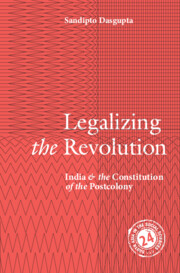Book contents
6 - Rights and Repression
Published online by Cambridge University Press: 07 May 2024
Summary
One cannot write poems about trees when the forest is full of police.
—Bertolt Brecht, The Life of GalileoLooking back, my dreams were full of prisons.
—Dionne Brand, Ossuary IThe right of the people to rebel against a government also [implies] the duty of the government to hang the people for the rebellion. These go together.
—Pattabhi Sitaramayya, Constituent Assembly Debates,25 November 1949Since the beginning of the Cold War, constitutions came to be known primarily as charters consisting of certain fundamental and inviolable norms: norms whose inviolability best captured the spirit of the ‘free world’. Constitutions were meant to limit the exercise of state power through some norms whose validity was universal. Central to that conception was an enumerated set of rights whose template was the Bill of Rights in the American constitution. ‘Any critique of rights,’ Duncan Kennedy wrote, ‘smacked of Stalinism.’ The centrepiece of the post-war Japanese and West German constitutions (both drafted under United States occupation) was an extensive list of rights. Even the new international order had its own ‘bill of rights’. If the Bill of Rights was a clear line of contrast between the free West and the unfree Soviets, there was a third part of the world whose position was more ambiguous.
Most of the postcolonial states adopted some version of a bill of rights. But what exactly rights meant in a postcolonial context – liberation? conservatism? mimicry? insignificance? – remained a matter of debate. The fall of the Soviet Union, however, ended that debate and any political challenge to the empire of rights. The ‘hallmark of [the] process of “democratization”’ of post-socialist Central and Eastern Europe ‘was the formal adoption of bills of rights as the essential marker of constitutional change in the emergence of each new democratic regime’. In the postcolonial world, it was time to abandon any lingering ambiguity, to recast (if not entirely remake) constitutional texts and practices in terms of this new ‘rights revolution’. Since then India's own version of the Bill of Rights known as the ‘fundamental rights’ has commandeered the overwhelming share of scholarly attention on the Indian constitution, as well as in textbooks, law school curricula, and public commentary.
- Type
- Chapter
- Information
- Legalizing the RevolutionIndia and the Constitution of the Postcolony, pp. 203 - 231Publisher: Cambridge University PressPrint publication year: 2024

